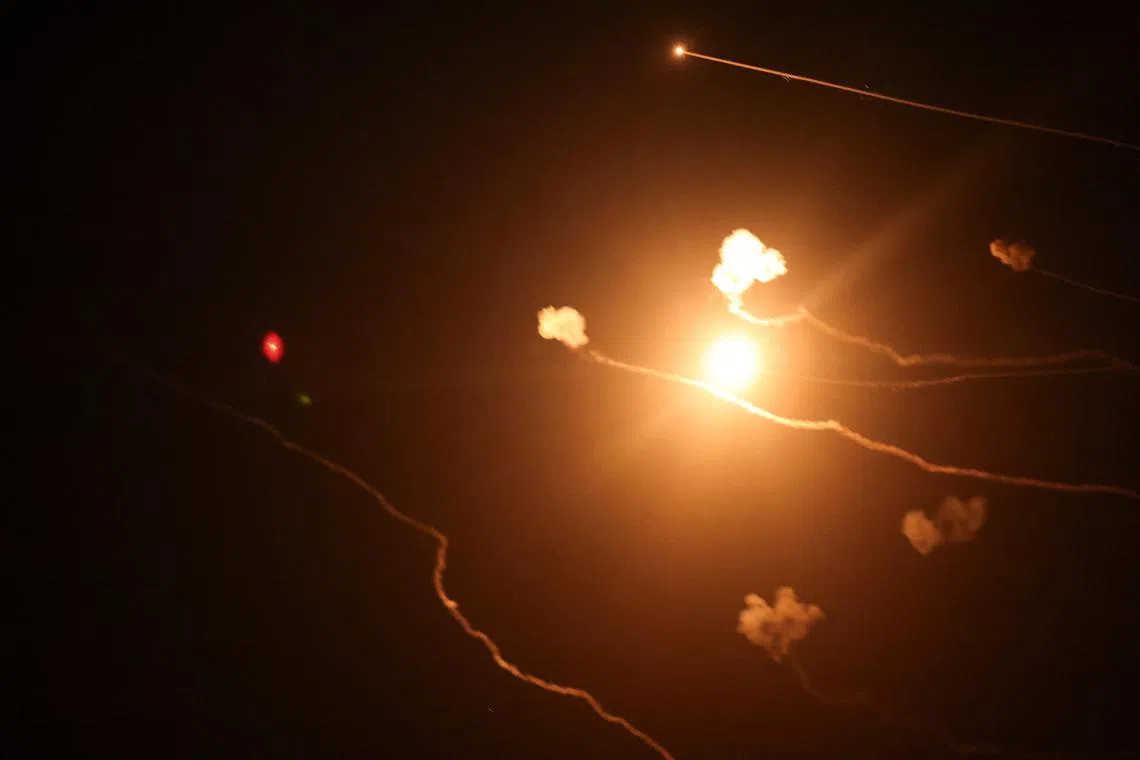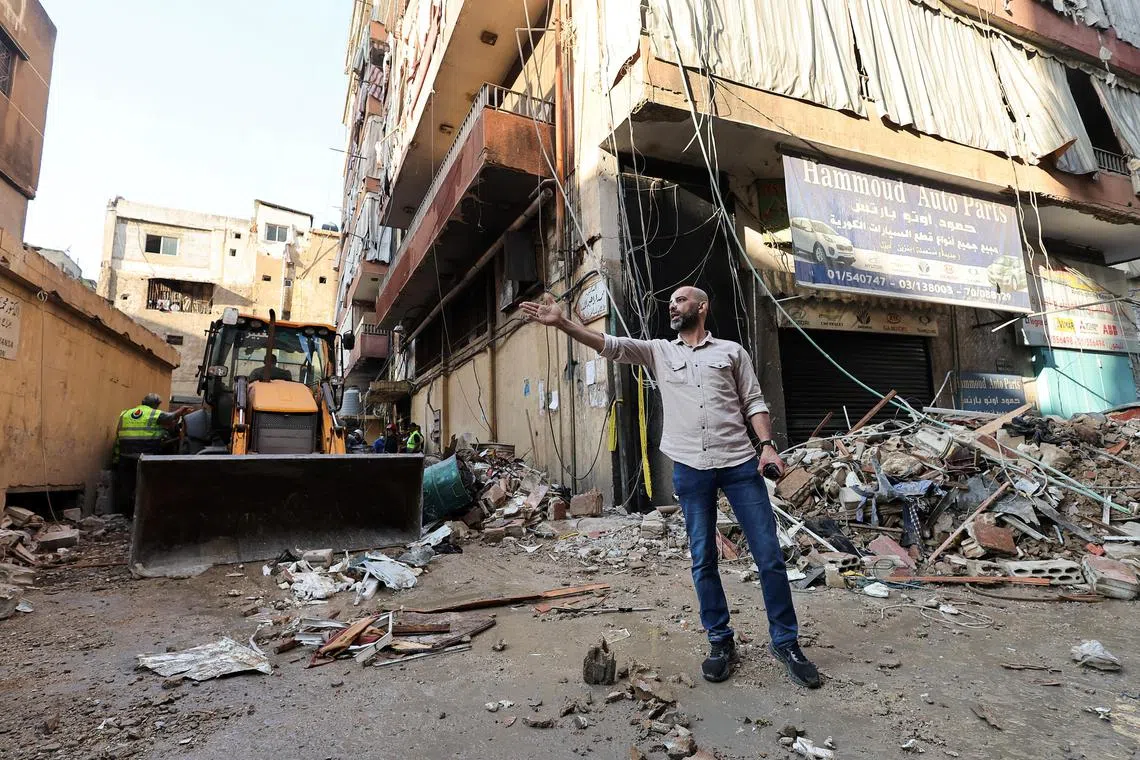Israel launches more strikes at Lebanon after intercepting first missile fired by Hezbollah at Tel Aviv
Sign up now: Get ST's newsletters delivered to your inbox

Israel's Iron Dome missile defence system intercepts rockets fired from Lebanon on Sept 24.
PHOTO: REUTERS
BEIRUT – Israel widened its air strikes in Lebanon on Sept 25 after shooting down the first missile fired by the militant group Hezbollah at Tel Aviv.
Hezbollah said it fired a ballistic missile targeting the headquarters of Israel’s feared spy agency Mossad.
“The Islamic Resistance launched a ‘Qader 1’ ballistic missile at 6.30am on (Sept 25)… targeting the Mossad headquarters in the outskirts of Tel Aviv,” Hezbollah said in a statement.
“This headquarters is responsible for the assassination of leaders and the explosion of pagers and wireless devices,” the Iran-backed group added, referring to attacks last week that killed scores in Lebanon, including one of Hezbollah’s top commanders.
The Israeli military said it was the “first time ever” a missile fired by Hezbollah reached the Tel Aviv area before being intercepted by air defences.
The White House said the missile strike on Tel Aviv was “deeply concerning”, but that a diplomatic off-ramp remains to avoid an “all-out war”.
“It’s certainly deeply concerning, obviously to the Israelis, of course, but also to us,” White House National Security Council spokesman John Kirby told CNN. “There is still time and space for a diplomatic solution here to de-escalate the tensions and to prevent an all-out war.”
Hezbollah struck at Tel Aviv as Israel expanded the zones it has been attacking
The air strikes also hit Bint Jbeil, Tebnin and Ain Qana in the south, and the village of Joun in the Chouf district near the southern city of Sidon.
The Israeli military said it hit 280 targets belonging to Hezbollah’s intelligence directorate.
“The strikes destroyed intelligence-gathering tools, command centres and additional infrastructure used by the enemy to build an intelligence situational assessment,” it said.

A man at the site of an Israeli strike in Beirut’s southern suburbs, Lebanon on Sept 24, 2024.
PHOTO: REUTERS
New phase
Hezbollah and Israel have been locked in near-daily exchanges of cross-border fire since the Palestinian militant group Hamas launched an unprecedented attack on Israel on Oct 7, 2023
That attack on Israel resulted in the deaths of 1,205 people, mostly Israelis.
Israel’s retaliatory military offensive has so far left at least 41,467 Palestinians dead in Gaza.
Major-General Ori Gordin, head of the Israeli military’s northern command, said Israel has entered a new phase in its campaign and must be prepared for “manoeuvring and action”.
A military statement did not specify whether the remarks were a reference to a possible ground incursion into southern Lebanon.
“The operation began with a significant blow to Hezbollah’s capabilities, focusing on their firepower capabilities, and a very significant hit on the organisation’s commanders and operatives,” Maj-Gen Gordin said.
“Facing this, we need to change the security situation, and we must be fully prepared for manoeuvres and action.”
Israel’s military leaders have said they are prepared for a range of options as it battles Hezbollah – a more sophisticated, disciplined and experienced enemy than Hamas.
Israeli troops have been training for months for a possible ground operation inside Lebanon aimed at securing its northern border and enabling thousands of Israeli residents who fled for their safety to return to their communities, one of Prime Minister Benjamin Netanyahu’s government’s top war priorities.
Israel’s close ally, the US, is sticking by it despite concerns about civilian casualties.
While Arab states have condemned Israel’s military campaigns, they have not taken strong steps that would force it to rein in the most powerful military in the Middle East.
Half-a-million displaced
As many as half a million people have been displaced since the latest round of fighting began on Sept 23, officials said, some crossing the border to Syria to flee Israeli bombing.
Ms Thuraya Harb, a 41-year-old housewife at a makeshift centre for displaced families in Beirut, said her family fled “with nothing but the clothes on our backs”.
“I didn’t want to leave my home, but the children were scared,” the mother of four said.
In Beirut, thousands who fled from southern Lebanon are now sheltering in schools and other buildings.
The new offensive against Hezbollah has stoked fears that the conflict between Israel and Hamas in Gaza is widening and could destabilise the Middle East.
“Lebanon is on the brink,” UN Secretary-General Antonio Guterres said on Sept 24. “The people of Lebanon, the people of Israel and the people of the world cannot afford Lebanon to become another Gaza.”
US President Joe Biden warned against a full-blown war in Lebanon in his speech at the UN General Assembly in New York on Sept 24.
“Full-scale war is not in anyone’s interest. Even though the situation has escalated, a diplomatic solution is still possible,” Mr Biden said in New York.
But Mr Netanyahu vowed to continue the withering air campaign.
“We will continue to hit Hezbollah... The one who has a missile in his living room and a rocket in his home will not have a home,” he said. AFP, REUTERS


